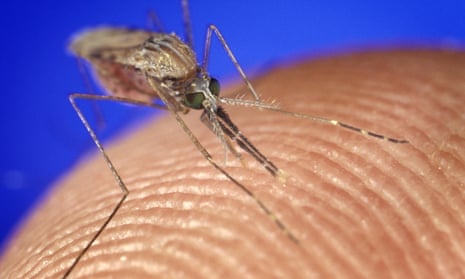Greater investment in satellite tracking of mosquitoes is vital in the fight to eradicate malaria, Bill Gates said on Wednesday.
Gates told the heads of Commonwealth states that innovation was needed to tackle the resurgence of the disease. “If there is one lesson we have learned … it’s that we have to keep innovating to control malaria, because conditions evolve,” he told the meeting in London, where a total of £2.7bn was pledged in a drive to halve the number of malaria cases across the Commonwealth.
“The mosquito and the parasite develop resistance to the interventions we use to fight them. People move around and constantly change the patterns of transmission.”
He added: “We need surveillance with much more geographical detail, we need it in real time, and we need it to capture more information.”
Gates, chair of the Bill and Melinda Gates Foundation – which announced it will extend its investments in malaria by an additional £700m through to 2023 – said advances in satellite imaging would help track the patches and spikes in malaria.
The newest frontier of surveillance is genetic sequencing of geolocated mosquito and parasite samples. These processes will be able to tell scientists whether cases in a given area are the result of residual transmission or imported from elsewhere.
Gates said: “It will serve as an early warning system about strains that are developing resistance to our tools.”
For the first time in 10 years, malaria cases are no longer falling. Not only has progress stalled but in some countries the trend has reversed.
Six out of 10 malaria cases globally occur in Commonwealth countries.
The leaders of those nations are being urged to make a historic commitment to halve the number of malaria cases by 2023 – a goal that, if successful, would prevent 350 million cases and save 650,000 lives.
The heads of 16 out of 53 Commonwealth countries attended Wednesday’s summit, hosted by the governments of Rwanda, Swaziland and the UK. Rwanda is one of the countries experiencing a rise in malaria cases.
Pedro Alonso, director of the World Health Organization global malaria programme, warned that the fight against the disease is at a crossroads.
“History has taught us well that when we lift our foot from the accelerator malaria comes back with a vengeance. We must take a decisive leap forward or we risk going backwards and we have seen that already happening in a number of countries,” he told the Guardian.
Last year, a report by the WHO found that Rwanda and Nigeria saw more than 1 million new cases of malaria between 2015 and 2016.
Twenty-four countries had an increase of more than 50,500 cases in 2016.
Just five of the 29 high-burden countries, including Gambia and Madagascar, saw a significant decrease in malaria cases.
“We are stalling and unless we do something urgently we are going to see this trend continue in the coming years,” said Alonso.
The summit will call for greater investment in new ways to combat the disease as the existing methods – nets, sprays and treatments – come under threat from drug and insecticide resistance.
Pharma company GSK has pledged £175m in research and development on top of existing funding that includes work to implement the world’s first malaria vaccine, due to be piloted in Ghana, Kenya and Malawi later this year.
It is anticipated the company’s new interventions – delivered on a not-for-profit basis – will reach more than 3 million people worldwide.
Meanwhile the Global Fund to fight Aids, Tuberculosis and Malaria announced $2bn of funding from 46 countries affected by malaria between 2018 and 2020.
The UK has already pledged £500m a year to tackling the disease until 2020-2021. Of that £100m will be used to fund-match contributions from private donors through the Global Fund.
The prime minister, Theresa May, said: “We will support and incentivise others to invest in what is needed, from cutting edge research to ensuring access to malaria treatment and prevention for those most at risk.”
Global funding for malaria has plateaued since 2010 and is disproportionately provided by donor countries rather than those with malaria risk.
The cost of malaria to African economies is estimated at $12bn (£8bn) a year in direct costs. It consumes 25% of household income in high-burden areas due to lost productivity and healthcare-related expenses.
The Ghanian president, Nana Akufo-Addo, said: “We are on a cliff edge. Either we step back and save millions more lives or we fall and see a deadly resurgence that could take half a century to recover from.
“This is not a plea for more aid money from western donors. I have publicly committed myself to African leaders finding African solutions to African problems. It is right we take responsibility for our own destiny.”
He assured: “Where greater domestic funding is needed we will find the money.”
Joy Phumaphi, executive secretary of the African Leaders Malaria Alliance, said the reasons for a resurgence in some countries varied.
“The east African countries have had a distinct challenge because of the El Niño phenomenon – they have had flooding every year now for several years. There has also been an increase across all countries in temperature attributed to climate change.”
These conditions have led to an increase in mosquito populations, she said.
“In Rwanda, they have massively increased their rice production, and rice paddy fields provide ideal breeding ground for mosquitoes.”
James Whiting, executive director at Malaria No More UK, said it would be a huge step forward if Commonwealth countries, where about half of all global malaria cases are found, were to meet the 2023 target.
“Our hope is that this is the beginning of a tidal wave across the world of reigniting the malaria campaign.”
